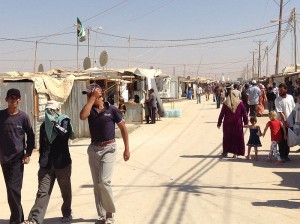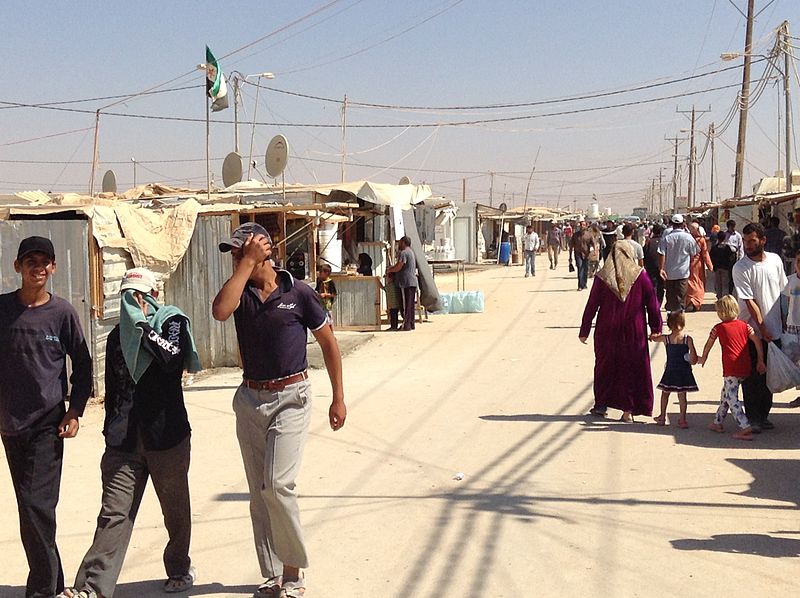
The Middle East has experienced some of the worst refugee crises in modern world history. The repeated floods of refugees, from Palestinians to Iraqis to Syrians, have heavily impacted both Lebanon and Jordan in particular. In many ways, these states have addressed refugees in a similar institutional manner, yet Lebanon has experienced turmoil and violent unrest while Jordan’s political realm has remained far more unified. One differentiating feature stands out as an explanation for these dramatically different results. Jordan and Lebanon have near opposite political systems, which have determined the effect refugees have on political divides and stability.
Lebanon and Jordan have remained similar in their approach to international and regional laws. Like other countries in the region, they have not acceded to the 1951 Geneva Convention relating to the Status of Refugees or the 1967 Protocol to the Convention, which 144 of the 192 states in the United Nations have signed.[11] Jordan and Lebanon, among other Middle Eastern states, have voiced concerns that signing this treaty would undermine their ability to achieve right of return for Palestinian refugees. Jordan signed a memoranda of understanding with the United Nations High Commissioner of Refugees (UNHCR) in 1998, and both states have worked closely with the UNHCR and the United Nations Relief and Works Agency (UNRWA) for Palestine Refugees in the Near East despite not signing the convention.[11] Although the UNRWA was originally designed to be a temporary aid agency for Palestinians displaced in the 1948 Arab-Israeli Conflict, it requires agreements with host countries in order to provide services in refugees camps. Both Lebanon and Jordan have made such agreements with the UNRWA. In regards to regional treaties and agreements, neither Lebanon nor Jordan endorsed the Declaration on the Protection of Refugees and Displaced Persons in the Arab World.[11] Both states are members of the League of Arab States, and have signed the Casablanca Protocol of 1965 or the Protocol for the Treatment of Palestinians in Arab States.[7] This protocol states that countries should treat Palestinian refugees as they would their own nationals in regards to employment, residence and movement between states, while allowing the refugees to maintain their Palestinian nationality. However, this offers no protections to non-Palestinian refugees, and has not been strictly adhered to by Lebanon or Jordan.[7]
Domestically, Lebanon and Jordan have set in place legal barriers to the permanent integration of refugees. Both states have avoided officially labeling refugees, which prevents them from accessing special privileges and rights that refugees are afforded in other states. Jordan has treated Iraqi refugees as foreign visitors under the law rather than identifying them as refugees.[7] Lebanon has avoided labeling Syrian refugees as refugees, and has accused some of them of being militants.[5] Another theme in both states’ legal treatment of refugees is refusing to create channels for most refugees to permanently reside within their borders. Jordan has made some of the UNHCR’s actions within its borders contingent on refugees being resettled in another country rather than assimilated into local communities.[1] The Lebanese Ministry of Labor has created broad lists of jobs that can only be legally held by Lebanese nationals, and created many obstacles for refugees to overcome before they can obtain work permits.[7] These actions reveal both states’ trepidation and resistance towards bearing the burden of large refugee populations permanently.
Because of similar historical crises and periods of unrest perceived to be caused by refugee populations, the governments of Lebanon and Jordan share parallel attitudes towards refugees. In the 1970s, Palestinian guerrilla groups settled in refugee camps in Lebanon, which they used as a base to attack Israel.[2] Many people in Lebanon, including political elites, still believe these Palestinian militants were solely responsible for the war, even though violence was also perpetrated against Palestinian refugees early on in the conflict. The Lebanese National Movement rose up against the Maronite regime in support of unrestricted movement for Palestinian fighters and for greater political representation of Muslims. Non-Maronites were excluded from the presidency under the confessional political system the French had left behind. A brutal and bloody civil war erupted between Christian militias and the Palestinian Liberation Organization. Over the course of the war, Palestinian refugee camps were specifically targeted and refugees were blamed for the war.[2] Jordan equally blamed Palestinian refugees after the events of Black September in 1970. Palestinian guerilla fighters formed their own administrative networks within refugee camps in Jordan and used the camps as a base to conduct raids against Israel. Tension mounted between the refugees and the Jordanian government, until it reached a tipping point when the Popular Front for the Liberation of Palestine hijacked civilian airplanes and threatened to kill the hostages if Jordanian forces interfered. The Jordanian army responded by relentlessly attacking the refugee camps and many innocent Palestinians along with fighters were killed.[2] Much like in Lebanon, refugees were blamed for the unrest and violence, and the government remained wary of them.
Another shared theme in Jordan and Lebanon’s policy is the refusal of both governments to take strong stands against the refugees’ home states. Lebanon has directly refused to become involved in the Syrian conflict or even to chastise the Assad regime. Former Prime Minister of Lebanon Najib Mikati stated “taking a stand would be detrimental to Lebanese society and I will not allow that” when asked about the actions of the Syrian government in 2012.[5] Lebanon created the Baabda Declaration, a national political agreement to avoid divisive rhetoric and stay neutral on the Syrian issue, and has recently reaffirmed the need to abide by this declaration.[3] Jordan has also avoided being outspoken about Syria, and has allowed other Arab states to pioneer criticisms of Syria. Jordan did not begin to oppose the Syrian regime until there was overwhelming regional and international pressure for it to do so.[4] During the years when the largest amounts of Iraqi refugees were pouring into Jordan, Jordan maintained positive relations with Saddam Hussein’s regime.[1] Jordan created an aid fund for Iraqis in Iraq, and detained Iraqis who wrote articles in Jordanian newspapers that criticized the Iraqi government.[1] Additionally, Jordan and Lebanon have cooperated with intelligence agents from the home states of their largest refugee populations. Syrian refugees have reported purposefully not registering as asylum seekers in Lebanon because they believe Lebanese authorities will turn their names over to Syrian forces.[5] In the late 1990s, Jordan allowed Iraqi governmental agents to kill Iraqi opponents in Jordan, and turned over some Iraqi detainees to Iraq.[1] Jordanian authorities have also treated political activity among Syrian refugees with suspicion, and many Syrian refugees fear refoulement.[6] However, despite these actions, both Lebanon and Jordan have kept their borders open to refugees and the great majority of refugees in both states crossed the border legally.[9, 5]
Beyond their governments’ perspectives, Jordanian and Lebanese nationals share similar perspectives on the presence of refugees within their countries. In both Lebanon and Jordan, local communities have hosted refugee families and provided them with food, shelter, and basic services.[9, 5] In these situations, many Lebanese and Jordanian households have allowed refugees who left their home countries with little to nothing to stay with them in their own homes.[10] However, the hospitality and generosity of the Jordanian and Lebanese people is not endless. Many of the communities that have been supporting refugees are not wealthy, and are very conscious of the negative effect the influx of refugees has had on their local economies.[1, 5] Lebanese nationals have reported believing that the flood of refugees into their state prolonged and reinforced the recent economic crisis and increased prices.[5] Jordanians have widely expressed resentment about having to compete with Iraqi and Palestinian refugees for jobs.[1] Citizens of both states have also accused refugees of increasing crime rates and of producing unrest.[1, 5] Even refugees who resettled in Jordan and Lebanon have been reported to resent newcomers because of the additional strain on resources and increased competition for jobs. The Center for Strategic Studies found in a recent poll that 70 percent of Jordanians, including the large population of naturalized Palestinians, oppose allowing any more Syrian refugees into the country.[8]
In reality, refugees have impacted the economies and employment rates of Lebanon and Jordan. In Jordan, Syrian refugees have congregated primarily in the northern border area, which is one of the poorest regions in the country.[9] This has increased competition for jobs in a region where employment opportunities were already scarce. Additionally, refugees are often forced to take labor jobs or work in the informal job market because they have a difficult time obtaining work permits, placing them in direct competition with working class Jordanians. In Lebanon, refugees have also become a heavy burden on communities. In northwest Lebanon, where most Syrian refugees are concentrated, communities suffer from poor infrastructure, high unemployment and primarily seasonal job opportunities.[5] These conditions have only been worsened by the influx of refugees to the area. The increased population in Lebanon caused by the arrival of Syrian refugees has caused prices of basic goods to rise.[5] Refugees in Lebanon and Jordan often entered these countries with very little and found themselves barred from many forms of employment in competitive job markets. This led to the formation of poverty belts around Jordanian and Lebanese cities, particularly Amman and Beirut.[1, 5] High costs and legal restrictions have forced many refugees to reside in temporary housing and in very close quarters. Together all of these factors have segregated the poorest refugees in both states from nationals of Lebanon and Jordan, and produced new impoverished regions which are substantial challenges for the governments.
Lebanon and Jordan have both primarily relied on the UNHCR, civil society, and international aid to provide much needed resources to refugees. In both states, the UNHCR and the UNRWA are the primary actors registering refugees. Consequently, they have controlled classifying who qualifies as a refugee and evaluating claims and appeals.[11] UNRWA explicitly states it does not officially define Palestinian refugees, but merely has an “operational definition” to allow it to provide necessary services. It defines Palestinian refugees as Palestinians who resided in Palestine in 1946 to 1948 then were displaced in the 1948 Arab-Israeli Conflict and their descendents. The UNHCR operates under a more formal and internationally applicable definition of refugees than the UNRWA. Both Lebanon and Jordan have accepted the UNHCR’s authority over classifying refugees, and their own officials and authorities work in close conjunction with the UNHCR.[11] Refugees can only receive aid from the UNHCR if they become a registered refugee, which has proven problematic. The UNHCR estimated that in January 2013 there were 704,500 refugees and asylum seekers in Jordan, and only 283,000 of them had received assistance from the UNHCR.[9] Iraqi refugees faced an especially difficult obstacle to registering in Jordan: under Saddam Hussein’s regime in Iraq, seeking asylum in another state was punishable by death.[1] Iraqi refugees were afraid to take the risk that their claim would be rejected and they could then be deported to Iraq, where they would be killed.[1] In Lebanon, dependence on the UNHCR proved difficult when Syrian refugees began to populate the Bekaa region, where there was not a UNHCR office. In this case, desperately needed aid and supplies were delayed and had to be distributed by non-governmental organizations. Non-governmental organizations have taken over many duties related to refugees in Lebanon, such as distributing food and clothing, paying for medical services, and helping refugee children to receive an education.[5] Often these organizations and groups have their own political prerogatives and gain soft power by cultivating refugee dependence on them. Lebanon and Jordan have heavily relied on civil society and the United Nations to provide resources and assistance to refugees, which has detached these governments from these services and isolated them from the conditions refugees in their state live in.
Lebanon and Jordan have been faced with similar refugee crises and have approached them in parallel ways, yet Lebanon has faced far more political upheaval and polarization than Jordan. The key differentiating feature between these two states is their political systems. Lebanon has a confessional political system that was created by the National Pact in 1943. Under this system, top governmental offices are each restricted to a certain ethno-religious group. For example, only Maronites can hold the presidency. This system institutionalized deep-seated sectarian divides in the Lebanese population. Leading families within each group corrupted elections and frequently turned to nepotism and clientelism, which intensified the sectarian divides.[2] Although most evident during Lebanon’s Civil War, 23 years later these same divides still impact every aspect of Lebanese political life. These pre-existing divisions, created and exacerbated by the Lebanese political system and the political culture surrounding it, make Lebanon particularly vulnerable to instability and conflict. The head of the International Committee of the Red Cross, when speaking about the refugee situation in Lebanon, stated, “It must be understood that Lebanon, with its denominational puzzle, is very sensitive”.[5] For this reason, the huge influx of refugees into Lebanon has resulted in far more violence, polarization and conflict than in Jordan. Jordan’s political system stands in stark contrast to Lebanon’s system. Since the end of the mandate system, Jordan has been consistently ruled by a monarchy. Although there have been protests and objections to the lack of democracy especially after the Arab Spring, the monarchy has insulated Jordan from polarization and sectarian divides in its government.
Large influxes of refugees can put tremendous political, social and economic pressure on any state, but political systems that restrict positions to certain ethnic or religious groups are particularly vulnerable. Long-term demographic change in Lebanon has caused serious tension, evidenced by the country’s failure to conduct a national census since 1932 before the founding of the modern Lebanese state. The accelerated demographic change presented by floods of refugees exacerbates these tensions even further. Meanwhile, states like Jordan that do not have a political system centered around ethnic or religious divides can bear rapid demographic shifts with less instability.
Sarah Lombardo
International Affairs ’15
[1] Chatelard, Geraldine. “Jordan as a Transit Country: Semi-protectionist Immigration Policies and their Effects on Iraqi Forced Migrants.” New Issues in Refugee Research. (2002).
[2] Cleveland, William, and Martin Bunton. A History of the Modern Middle East. Boulder, CO: Westview Press, 2013.
[3] El-Basha, Thomas. “Lebanon Dissociates on Syria at Arab League Summit.” The Daily Star. (2013).
[4] Luck, Taylor. “U.S., Jordan Stepping Up Training of Syrian Opposition.” Washington Post. (2013).
[5] Naufal, Hala. “Syrian Refugees in Lebanon: The Humanitarian Approach under Political Divisions.” Migration Policy Centre. (2013).
[6] Phillips, Christopher. “The Impact of Syrian Refugees on Turkey and Jordan.” Chatham Houses. (2012).
[7] Suleiman, Jaber. “Trapped Refugees: The Case of Palestinians in Lebanon.” Protecting People in Conflict and Crisis. (2009).
[8] Sweis, Rana. “Resentment Grows Against Syrian Refugees in Jordan.” The New York Times, , sec. Middle East, May 09, 2013.
[9] United Nations High Commissioner of Refugees, “Jordan.” Last modified 2013. Accessed April 3, 2013.
[10] United Nations High Commissioner of Refugees, “Lebanon Update.” Last modified 2012. Accessed April 3, 2013.
[11] Zaiotti, Ruben. “Dealing with non-Palestinian Refugees in the Middle East: Policies and Practices in an Uncertain Environment.” Oxford Journals. (2006).



